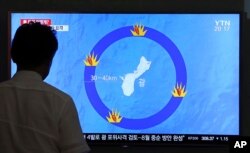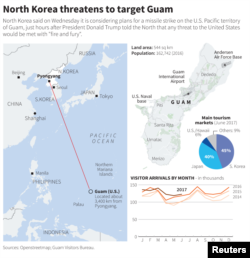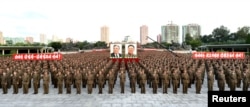U.S. President Donald Trump has issued yet another warning to North Korea, saying the U.S. military is "locked and loaded" and prepared to retaliate against Pyongyang if initiates warfare against the U.S.
"Military solutions are now fully in place, locked and loaded, should North Korea act unwisely," Trump warned in a Friday morning post on Twitter. Trump added: "Hopefully Kim Jong Un will find another path!"
The president's warning comes hours after China said it would not assist North Korea if it launches a first strike that threatens U.S. soil and the U.S. retaliates.
The warning from China was published in an editorial Friday in the Global Times, a state-owned newspaper that recommended Beijing remain neutral in the event of a North Korean first strike.
"China should ... make clear that if North Korea launches missiles that threaten U.S. soil first and the U.S. retaliates, China will stay neutral," said the newspaper, which is not an official voice of China's Communist Party.
The editorial said, however, that China would intervene if the U.S. and ally South Korea collaborate militarily with the intent of ousting Kim Jong Un's regime.
"If the U.S. and South Korea carry out strikes and try to overthrow the North Korean regime and change the political pattern of the Korean Peninsula, China will prevent them from doing so."
The editorial amounts to a reiteration of China's position on the escalating tensions on the Korean Peninsula, as it has repeatedly warned the U.S. and Pyongyang to refrain from taking provocative actions.
War of words continues
On Thursday, Trump stiffened his resolve against North Korea, saying if Pyongyang strikes first, "things will happen to them like they never thought possible."
Trump said that his earlier warning to inflict "fire and fury" on the reclusive communist regime for its nuclear weapons development program perhaps "wasn't tough enough."
Asked what would be tougher, Trump told reporters at his golf resort in Bedminster, New Jersey, "You'll see. ... North Korea better get their act together, or they're going to be in trouble like few nations ever have been in trouble in this world."
Trump's remarks came hours after North Korea said it is finalizing a plan to launch a salvo of four ballistic missiles to the waters off the shores of the U.S. territory of Guam, Pyongyang's latest provocation in the war of words between it and Washington.
Later Thursday at an event in California, Defense Secretary Jim Mattis said the United States is focused on diplomacy, but it is his responsibility to have military options ready "should they be needed" in the event of a war with North Korea -- an option he said "would be catastrophic."
Mattis stressed, however, that diplomatic efforts were gaining traction. "I want to stay right there, right now," he added.
In an unusually detailed announcement, North Korea's military said Thursday that within a week it would hand the regime leader Kim Jong Un a plan to fire Hwasong-12 missiles over Japan toward Guam, 3,300 kilometers to the south.
North Korea's state media has said that under the plan, four intermediate-range missiles would be fired into waters 30-40 km (18-25 miles) from Guam "to signal a crucial warning to the United States."
On Friday, South Korea's presidential office said that South Korea's chief of national security, Chung Eui-Yong, and U.S. counterpart H.R. McMaster reaffirmed their close cooperation on North Korean issues. Chung and McMaster had a telephone conversation to discuss North Korea, presidential spokesman Park Su-hyun said.
Concern is mounting in the Pacific region and around the world to the increasingly heated rhetoric between Washington and Pyongyang.
The Association of the South East Asian Nations issued a statement this week "expressing grave concern over the escalation of tensions in the Korean Peninsula." ASEAN ministers urged North Korea to "immediately comply fully" with all United Nations Security Council Resolutions, which include the most stringent sanctions yet that were imposed last week.
Japan has begun deploying surface-to-air missiles after neighboring North Korea threatened missile launches over western Japan and landing near Guam, Japan's Defense Ministry said Friday.
German Chancellor Angela Merkel said Friday she doesn't see a military solution to the rising tensions between the U.S. and North Korea, and she called on both countries to de-escalate their comments. "I think escalating the rhetoric is the wrong answer," she said.
Russian Foreign Minister Sergei Lavrov said the risk of a military clash between Washington and Pyongyang is "very high," and he added that language fueling the tensions is "over the top."
Despite the bravado, the Trump administration has been quietly engaging in back-channel diplomacy with North Korea for several months, according to The Associated Press. Discussions reportedly have focused on Americans who are jailed in the communist country and souring relations between the long-time adversaries.
When asked by a reporter Friday about reports of back-channel diplomacy, U.S. Deputy Assistant Secretary of State Patrick Murphy said he didn't "have anything to comment" but added, "Now is not the opportunity for dialogue because we have not seen North Korea's willingness to address ... fundamental problems" that include the development of missile and nuclear programs "in defiance of the international community."







